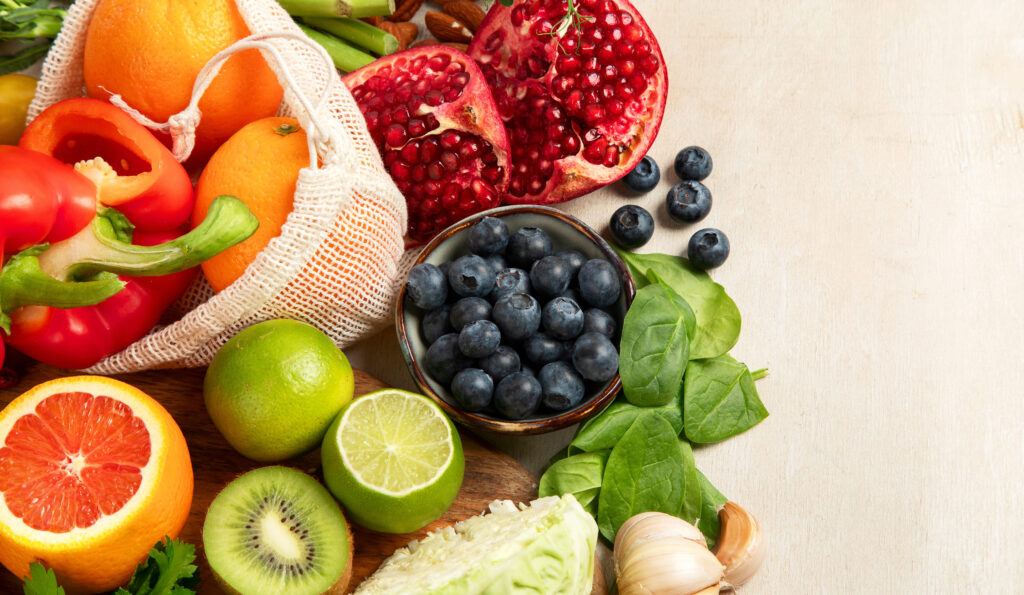We need to feed our mind and body the best balance of nutrients for energy and vitality. Here’s our Thrive Journey guide to healthy eating.
Nutrition is one of the 8 pillars of wellness – a collection of foundational components that combine to create optimal health and wellbeing. Nutrition includes what we eat and drink, as well as healthy lifestyle habits, such as eating regularly and mindfully with a positive attitude to food, whether you are trying to conceive or riding the hormonal and emotional chaos of menopause. Nutrition and your attitude to food matter.
Food is our fuel, and eating a healthy, balanced diet helps keep our body and mind in prime condition. It also protects us against disease and lays the groundwork for future health and longevity.
To find out more about the other pillars, check out our guide to the 8 pillars of wellness.

What Is Nutritional Wellness?
Nutritional wellness is about eating a balanced, whole-food diet that supports overall mental and physical health. Aim to have a daily diet that encompasses wholesome, nutritious foods, but remember not to be too strict – there is no perfect diet! Make sure you enjoy and appreciate your food.
Eat the rainbow: Have a variety of colourful veggies and fruit with plenty of wholegrains, lean protein, dairy, and healthy fats. Be adventurous and have fun trying different foods and recipes. Thrive Journey has some wonderful Ayurvedic recipes.
Mindful eating: resist the urge to eat on the run or eat too quickly. Savour each mouthful and practise mindful eating – noticing the flavours of what you are eating and paying attention to hunger and fullness cues, so you don’t overeat. Avoid distractions while you eat, such as watching TV or being on your phone. And chew your food thoroughly, as this breaks the food down, saliva begins to digest the carbohydrates, and makes it easier for your stomach to digest.
Adequate fuelling: eat enough for your lifestyle and age. Generally, women have around 2,000 calories a day and men around 2,500 calories a day, but it depends on your age, sex, height, weight, and activity level (1). Try to eat regularly and avoid overeating and extreme dieting.
Why Balanced Nutrition Matters
Think of food as medicine – by eating a balanced diet with foods from a range of sources and across all food groups, you help to keep your body strong, boost cognitive health, feel energised, and protect against illness.
Physical health: holistic nutrition is essential for our physical health, to help keep our immune function strong, boost energy, and prevent disease. And yet the Centers for Disease Control and Prevention states that just 1 in 10 adults eat enough fruit and veggies a day (2) – so we can all make improvements. According to the Heart Foundation, we should be eating two serves of fruit and five serves of veggies daily, as this will reduce the risk of coronary disease by 20 per cent. (3)
Mental and emotional well-being: Regular, healthy eating helps to keep our blood sugar stable, preventing energy crashes and regulating our mood. Having a diet rich in fruit, veggies, legumes, and nuts is known to help our mental health and can reduce the risk of depression. (4)
Healthy weight and hormones: A balanced diet and regular meals will promote a stable weight and happy hormones. Certain foods contain tryptophan (such as eggs, poultry, cheese, and nuts), which helps the body produce the uplifting hormone, serotonin (5). It can be a good idea to keep a food diary over the course of a week to make sure you are eating regularly and across all food groups.
Fertility and preconception health: Nourishing your mind and body with a healthy diet will help improve fertility outcomes and support your health in the future. If you are planning a baby, make sure you have enough folic acid before pregnancy, as this supports fetal development.

Basics of a Balanced Diet (How to Achieve Nutritional Wellness)
Eating a healthy diet will not only help you feel better, but it can also sharpen up your taste buds – helping you to enjoy your food and become a bit more adventurous with your culinary choices. Try to think of it as a fun challenge rather than a boring chore!
Eat a variety of whole foods: Fill your plate with mainly veggies, a portion of lean protein (animal or plant), wholegrains, and healthy fats (such as avocado and olive oil). Variety and colour mean it’s more likely to have a range of essential minerals and vitamins. The Mediterranean diet (6) is recommended, as it is mainly plant-based and includes colourful foods rich in disease-fighting antioxidants such as tomatoes, nuts, and beans. (7)
Limit processed foods and sugar: Having the occasional ‘sweet treat’ is fine, but generally avoid processed foods, junk food, and sodas, as these can be detrimental to your health and deplete your energy. Commercially baked goods, such as biscuits and cakes, are high in trans fats (trans fatty acids, TFA), which are linked to cardiovascular disease. The World Health Organisation recommends limiting your consumption of trans fat to less than 1 per cent of your total daily food intake. (8) And swap out sugary drinks for water and herbal teas.
Stay hydrated: Keep your fluid levels up, typically aim for around 6-8 glasses of water a day, but remember everyone is different, so you may need a bit more or less than this. You can also get some of your fluid intake from foods (such as cucumber and watermelon). In the ancient practice of Ayurveda, it is recommended to sip warm water throughout the day to help cleanse and hydrate the digestive tract. You might like to add some grated ginger for flavour. Staying hydrated can help with weight loss, maximise physical performance, and aid digestion.
Avoid excess salt: table salt can be dehydrating, so swap it with sea salt, Himalayan, or rock salt, which are more likely to be less processed and can include trace minerals. Dehydration can lead to fatigue, increased inflammation, and muscle cramps, and we can also confuse thirst for hunger, so make sure you keep your water bottle handy!
Key nutrients for wellness: For general wellness, make sure you are having a range of nutrients and minerals in your diet. This includes:
- Dietary fibre (sources include: wholegrain cereals, fruit, and veg)
- Protein (eggs, seafood, chicken, nuts)
- Iron (meat, poultry, seafood)
- Magnesium (leafy green vegetables, nuts, and seeds)
- Zinc (shellfish, meat)
- Calcium (leafy greens, broccoli, seaweeds, nuts, milk, yoghurt, cheese) in your diet.
Nutrition and Fertility (Connecting the Dots)
Good nutrition is vital if you are planning to start a family. Having a healthy diet will help your unborn baby grow and develop, and can reduce the risk of disease.
If you are thinking of conceiving, have extra folate (sources include wholegrain bread and cereals, oranges, strawberries, and bananas). A daily supplement with 400 micrograms of folic acid is recommended one month before pregnancy and for the first three months of pregnancy. Increase your iron (sources include meat, fish, legumes, and nuts), as well as eating Vitamin C-rich foods such as tomatoes and capsicum, which boost iron absorption (9).
Other nutrients especially important for pre-conception include Omega-3s (walnuts, chia seeds, fish such as salmon, mackerel, and sardines) and Vitamin D, which is mainly made by exposure to the sun, but small amounts can be found in certain foods (salmon, eggs, and some fortified cereals).
A balanced diet supports regular cycles and hormone production. It’s also a good idea to maintain a healthy weight, avoid alcohol and caffeine, and eat little and often to keep blood sugar levels stable.
You don’t have to be too strict, but by having a healthy lifestyle, you will start to feel and look better and build a strong foundation for your health and your baby’s health (10).

Five Quick Diet Tips to Get Started
There are lots of things you can do to help improve your diet, but you don’t have to do everything at once! Start with small changes, such as increasing the amount of veggies in your diet or swapping cookies for a handful of nuts and dried fruit, and you might be surprised at the difference this will make.
- Spring clean your pantry! – Give your pantry a makeover (and your fridge and freezer if you are keen!) Throw out anything beyond its use-by date and start thinking of healthy staple foods (such as rice, oats, canned fish, legumes, nuts, and seeds) you can keep in your home for when the munchies hit!
- Keep a food diary – this is a great way to check what and when you are eating. Are you eating all of the food groups? Are you skipping meals? Eating too late at night? What can you do to improve your diet and eating habits?
- Follow the 80/20 rule – you don’t have to be too rigid over your diet – what is important is your overall eating, so nourishing ‘clean’ foods 80 per cent of the time and treating foods for the other 20 per cent.
- Plan meals and snacks – have food on hand for when you do get hungry – a piece of fruit or some chopped up veggies and hummus for an afternoon work snack. If you like to cook, have a baking day and freeze portions for when you have less time.
- Don’t shop when you are hungry! – Do your groceries when you have eaten, otherwise you will be driven by hunger and are likely to overshop and impulse buy. Make a shopping list that aligns with your planned meals and snacks, and try to keep to it!
Conclusion & Next Steps
Balanced nutrition is fundamental to health, which is why it is one of the 8 pillars of wellness. But try not to be too concerned or worried about what you eat. The best thing is to have a relaxed attitude to food and let yourself have the occasional treat.
Anyone can begin to eat healthily or improve their diet; it’s just about starting and then noticing improvements in their mood, energy, and waistline.
Read our Thrive Journey guide to the 8 Pillars of Wellness to see how a balanced diet fits in with the other foundational pillars of health. And start feeling better today!
References:
- NHS – Live Well:
https://www.nhs.uk/live-well/healthy-weight/managing-your-weight/understanding-calories/ - Centes for Disease, Control and Prevention:
https://archive.cdc.gov/www_cdc_gov/nccdphp/dnpao/division-information/media-tools/adults-fruits-vegetables.html - The Heart Foundation :
https://www.heartfoundation.org.au/healthy-living/healthy-eating/fruit-vegetables-and-heart-health - Health Direct:
https://www.healthdirect.gov.au/food-drink-and-mental-health - Healthline:
https://www.healthline.com/health/healthy-sleep/foods-that-could-boost-your-serotonin - The Mayo Clinic:
https://www.mayoclinic.org/healthy-lifestyle/nutrition-and-healthy-eating/in-depth/mediterranean-diet/art-20047801 - Better Health:
https://www.betterhealth.vic.gov.au/health/healthyliving/antioxidants#antioxidants-and-free-radicals - The World Health Organization:
https://www.who.int/news-room/fact-sheets/detail/trans-fat - NSW Health
https://www.health.nsw.gov.au/kidsfamilies/MCFhealth/pregnancy/Pages/vitamins-minerals.aspx - The Royal Women’s Hospital:
https://www.thewomens.org.au/health-information/pregnancy-and-birth/a-healthy-pregnancy/food-nutrition-in-pregnancy
